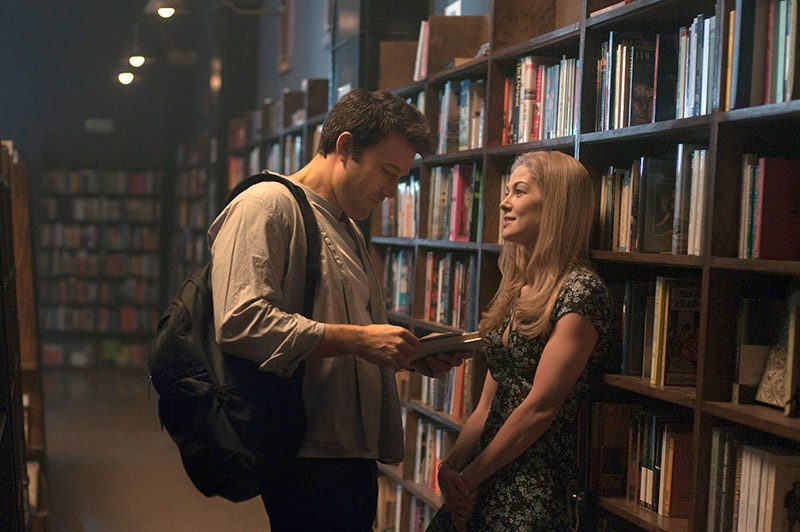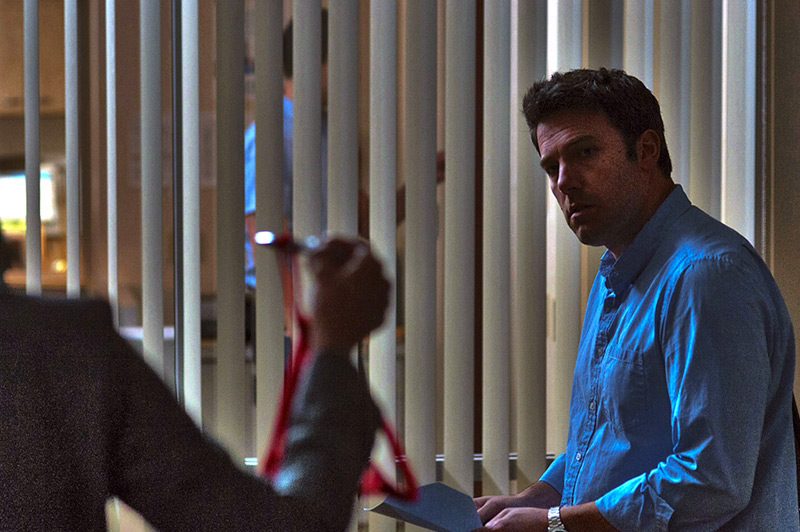SUMMARY
This is AI generated summarization, which may have errors. For context, always refer to the full article.

Amy Dunne has gone missing and her husband Nick, along with the rest of the gossip-hungry United States, is desperate to find her. But with little to no clue as to the whereabouts of Amy Dunne (Rosamund Pike), fingers start to point to the case’s most likely suspect, Amy’s own husband, Nick Dunne (Ben Affleck).
Based on the novel by Gillian Flynn, Gone Girl is a modern thriller with twists not much unlike a warped melodrama. Although the mystery of Amy’s disappearance stands as the film’s centerpiece, it’s the eroding marriage of Nick and Amy that lies in its core.
From the outside, Nick and Amy live a charmed life. Attractive, stable and generally well liked, it’s their seemingly indistinct relationship that allows them to blend among the rest of marital suburbia. But when Amy suddenly goes missing, what is eventually unearthed is more akin to a horror novel than a love story.
“Till death do us part,”goes the clichéd wedding vow. Unfortunately for Nick and Amy, that’s seemingly where their marriage is going.
Putting on appearances
Gone Girl is an extreme depiction of a crumbling marriage. While the motions of this dark thriller are undeniably exaggerated, and often difficult to accept with a level head, there’s a perverse truth to the decaying relationship between Nick and Amy.
Once the years have worn down the wedding bands, all that’s left are two people putting on appearances. It’s a cynical and awfully pessimistic view of marriage, and one that runs counterpoint to the usual “love conquers all” ethos of Hollywood.

The film shifts unsteadily between Nick’s present time point-of-view and Amy’s seemingly disembodied journal entries. But while the film’s structure can be jarring, it’s all part of an elaborate “he-said, she-said”account of a rotten relationship.
Ben Affleck’s naturally smug portrayal of the seemingly cold Nick Dunne works to add a layer off suspicion in the unraveling mystery. But it is Rosamund Pike’s uncanny ability to shift from fragile wife to cunning femme fatale that makes her character as difficult to read as her husband.
Warning: past this point, there are mild spoilers, particularly if you have not yet read the book. Click the button below if you would like to continue.
The film silently asks its audience to pick a side, but whomever you choose, we all bear witness to the warts and scars of Nick and Amy’s blemished marriage. Amy may be missing, but it becomes unmistakably obvious that she left Nick a long time ago.
“What have we done to each other?” Amy asks in her diary, a question posed to herself just as much as it’s posed to her anonymous audience. But Gone Girl never offers any real answers to Amy’s question. That’s because it doesn’t matter. And that’s because it’s too late.
A pessimistic indictment of marriage
Gone Girl carries the same DNA as Fincher’s underappreciated Zodiac and his disappointingly mediocre Girl With a Dragon Tattoo. But while the film is set in Fincher’s world of kidnappers, murderers and schemers, Gone Girl is a remarkably different beast.
It is lined with the familiar cold-hearted cynicism prevalent in Fincher’s work, and as expected, the personalities in Gone Girl are blanketed by a near numbing iciness.
Fincher has never been a director with a predilection for the romantic. And while you’d expect a film about marriage to have at least a tinge of heartfelt passion, whatever love is present between Amy and Nick is ultimately revealed to be an elaborate ruse.
We learn about the happier times between the Dunnes through the delicately scribbled entries in Amy’s diary. But while the film showers its audience with one sex-filled scene after the next, it’s hard to wrestle out an ounce of compassion for either Amy or Nick. And what starts out as a mishandled love story slowly evolves into a pessimistic indictment of marriage.
The ugly truth
The allure of David Fincher’s filmography isn’t that it tackles dark and twisted stories, but that it caters to a deep and hidden desire to connect with dark and twisted characters. But in Gone Girl, these characters aren’t serial killers or obnoxious billionaires; they are husband and wife.
In a conversation with his sister Margo (Carrie Coon), Nick admits that he’s happy Amy has gone missing. It’s a confession made in confidence, but even Margo, Nick’s own flesh and blood, can’t help but feel appalled by her brother’s damning admission.
When an entire country is caught in the whirlwind search for a missing woman, Nick’s confession reveals an ugly truth: there’s always a little bit of murder in every marriage.
Gone Girl is the cruel aftermath of happily ever after. But it is also an expertly crafted thriller that relies on very little spectacle to get its point across. It’s a cold and often callous depiction of marriage, but when love is gone, all that’s left is blood. – Rappler.com
 Zig Marasigan is a freelance screenwriter and director who believes that cinema is the cure for cancer. Follow him on Twitter at @zigmarasigan.
Zig Marasigan is a freelance screenwriter and director who believes that cinema is the cure for cancer. Follow him on Twitter at @zigmarasigan.
More from Zig Marasigan
- ‘Kimmy Dora (Ang Kiyemeng Prequel)’: A fallen franchise
- ‘My Little Bossings’: The horrible business of show business
- ‘Boy Golden’: Violent, colorful, and masterful fun
- ‘10,000 Hours:’ A higher standard of politics
- ‘Pagpag:’ Stylish superstition
- ‘Kaleidoscope World:’ A Magalona melodrama
- ‘Pedro Calungsod: Ang Batang Martir:’ A sermon best saved for church
- MMFF Cinephone: From film to phone
- ‘Islands:’ In the ocean of isolation
- ‘Shift’ is not a love story
- ‘Bukas Na Lang Sapagka’t Gabi Na:’ The art of rebellion
- ‘Blue Bustamante:’ A hero with a heart
- ‘Girl, Boy, Bakla, Tomboy’: A hilariously absurd party of four
- ‘Lone Survivor’: War through Western eyes
- ‘The Wolf of Wall Street’: the brilliant crime of capitalism
- ‘Bride for Rent’: Falling back on formula
- ‘Mumbai Love’: Lost in Bollywood
- ‘Snowpiercer’: Beautiful, brutal science fiction
- ‘The LEGO Movie’ Review: A genuine block-buster
- ‘RoboCop’ Review: More metal than man
- ‘American Hustle’ Review: Style, subtlety, raw energy
- ‘Starting Over Again’: A different kind of Valentine’s
- ‘Basement’ Review: Better left dead
- ‘Nebraska’ Review: An elegant ode to the country
- ‘Third Eye’ Review: A vision of inconsistency
- ‘Her’ Review: Growth, change, and love
- ’12 Years a Slave’: Why it deserved the Best Picture Win
- ‘Kamandag ni Venus’: An achievement in awfulness
- ‘Divergent’ Review: Troubled teenagers
- ‘Captain America: The Winter Soldier’ Review: Behind the shield
- ‘Diary ng Panget’ Review: Where youth is only skin deep
- Summer 2014: 20 Hollywood movies we can’t wait to see
- ‘Da Possessed’ Review: A rushed return
- ‘The Amazing Spider-Man 2’ Review: The enemy within
- ‘Godzilla’ Review: Size doesn’t matter
- ‘X-Men: Days of Future Past’ Review: Rewriting history
- ‘The Fault In Our Stars’ Review: Shines bright despite the faults
- ‘Noah’ review: Not the Bible story you know
- ‘My Illegal Wife’ Review: A film worth forgetting
- ‘How to Train Your Dragon 2’ Review: A soaring sequel
- ’22 Jump Street’ Review: Solid and self-aware
- ‘Third Person’ Review: A writer’s dilemma
- ‘Transformers: Age of Extinction’ Review: Mind-numbing deja vu
- ‘Overtime’ Review: ’90s thriller meets camp comedy
- ‘Dawn of the Planet of the Apes’ Review: More man than ape
- ‘She’s Dating the Gangster’: Asking for a greater love story
- ‘Hercules’ Review: More mess than myth
- Cinemalaya 2014: The 15 entries, what to watch
- Cinemalaya 2014: A quick guide
- ‘Trophy Wife’ Review: Tough choices, third parties
- ‘Guardians of the Galaxy’ Review: Fantastic trip to Neverland
- Movie Reviews: All 5 Directors Showcase films, Cinemalaya 2014
- Movie Reviews: All 10 New Breed films, Cinemalaya 2014
- To Mr Robin Williams, farewell from a fan
- ‘Teenage Mutant Ninja Turtles’ Review: Childhood taken hostage
- ‘Rurouni Kenshin: Kyoto Inferno’ Review: A promise to keep
- ‘Talk Back and You’re Dead’ Review: Story, what story?
- ‘Sin City: A Dame To Kill For’ Review: Lackluster return trip
- ‘The Giver’ Review: Thank you for your childhood
- ‘If I Stay’ Review: Between life and death
- ‘The Gifted’ Review: More than skin deep
- ‘The Maze Runner’ Review: Falling at the finish line
- ‘Lupin III’ Review: An unsatisfying con job
- ‘Rurouni Kenshin: The Legend Ends’ review: Fond, fiery farewell
Add a comment
How does this make you feel?
There are no comments yet. Add your comment to start the conversation.